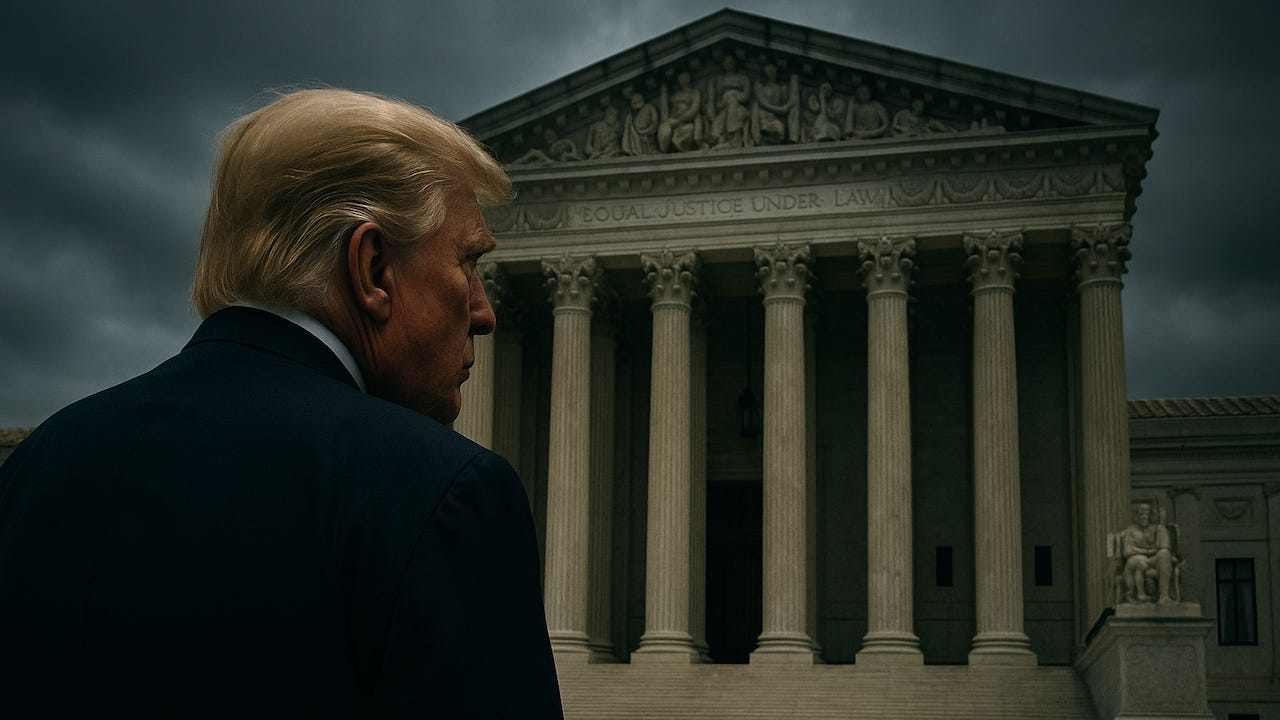Why Trump’s Attacks On ‘His’ Judges Will Backfire
The president targets the one conservative institution that can still punch back.
More remarkable developments from Ukraine this morning, which just carried out a third strike on one of Vladimir Putin’s pet projects: the bridge connecting Russia to occupied Crimea. Meanwhile, Russian war bloggers have identified the man they believe to be the mastermind of the drone attacks on military targets across Russia this weekend: former Ukrainian DJ Artem Timofeev. Hey, it’s important for guys to have hobbies. Happy Tuesday.
Get Away From My Face, You Leopard!
by Andrew Egger
Donald Trump’s breakup with the conservative legal movement was a long time coming. Most presidents would commit unspeakable acts to get the sort of home-field advantage Trump enjoys in the courts—most notably, a 6–3 conservative Supreme Court, a full third of whom he nominated himself. But Trump has long felt this arrangement entitles him to a certain standard of living: a world where he can operate more or less without judicial oversight. When “his” Supreme Court failed to abet his attempt to steal the 2020 election, he raged that they hadn’t had the “courage” to do what was necessary.
Four-plus years later, the pressure is still mounting, and not just at the Supreme Court level. Republican appointees on court after court have enraged the president as they worked to stymie Trump’s lawless actions.
The broader break with judicial conservatism came last week. On the heels of a 3–0 decision at the U.S. Court of International Trade straitjacketing his tariff authority—a decision that starred one of his own judicial nominees—Trump apparently decided he’d had enough. In a baggy, rambling 500-word post to Truth Social¹, he trained his rhetorical fire on judicial conservatism’s ideological home base, the Federalist Society, and its co-founder, former longtime vice president, and current board co-chairman Leonard Leo.
“I was new to Washington, and it was suggested that I use The Federalist Society as a recommending source on Judges,” Trump fumed, calling Leo a “real sleazebag” with “his own separate ambitions.” “I am so disappointed in The Federalist Society because of the bad advice they gave me on numerous Judicial Nominations. This is something that cannot be forgotten!”
I can’t deny there’s a certain “I never thought the leopards would eat my face” schadenfreude to this. Trump’s openly transactional 2016 embrace of the Federalist Society helped soothe the consciences of a lot of skeptical Republicans: How lawless and megalomaniacal could he REALLY be, if he shares our commitment to originalism and judicial restraint? And the Federalist Society types were perfectly content to let Trump slingshot them into the judiciary by the truckload.
But as he now lashes out in pique, Trump stands to hurt himself more than the Federalist Society. As a confederation organized more around a shared judicial approach than personal loyalties, there may be no group in Republican politics less susceptible to simply being bullied into submission. Instead, Federalist Society-sympathetic judges are likely to perceive Trump’s attack for what it really is: a rejection of the notion that even friendly judges should be able to restrain him at all, and a pledge to appoint nothing but unprincipled lickspittles in the future.
As things stand, there is a plethora of ways his attacks could come back to bite the president. They will only accelerate the growing sense among Federalist Society types already wielding significant judicial power that the president’s lawless actions are less an opportunity for testing out novel legal theories than a danger requiring immediate restraint. A Trump who played nice with the conservative legal movement was a Trump who got goodies like a new and expansive SCOTUS-approved definition of “presidential immunity.” Just eleven months after that ruling was handed down, it’s growing harder to imagine the Court deciding that case in the same way today (not that at least two of the justices wouldn’t try to find a way).
Trump also may find that his attempts to more aggressively shape the judiciary according to his whim result in him getting less opportunities to shape it at all. As our friend Gregg Nunziata of the Society for the Rule of Law points out, judges are rational actors who are less likely to retire if they feel they’ll be replaced by a presidential toady.
“Many judges who are eligible to retire or take senior status have been watching to see what they can expect from the White House,” Nunziata told Bloomberg News this week. “These are ominous signs for them.”
Already, we’ve seen other ways in which the legal profession has demonstrated some backbone. Trump’s lawfare campaign against America’s law firms seems to be sputtering out. While the courts have come to the defense of firms that wouldn’t bow to his blackmail, some of the ones that did are paying an unexpected price. The Wall Street Journal reports:
Support for the law firms that didn’t make deals has been growing inside the offices of corporate executives. At least 11 big companies are moving work away from law firms that settled with the administration or are giving—or intend to give—more business to firms that have been targeted but refused to strike deals, according to general counsels at those companies and other people familiar with those decisions.
Yesterday, JVL wrote about what’s becoming a key split screen of Trump 2.0: While official channels start to stiffen their spines against him, he continues to push the envelope anywhere he is permitted to move freely. This is most obvious when it comes to his jubilee of indefensible pardons for allies and his shocking use of federal law enforcement and the military, including the growing deployment of masked plainclothes officers and a purge of top brass thought to be insufficiently “loyal” to Trump himself.
All this is intensely alarming—and if you keep reading below, Bill will alarm you some more. But it would be worse if Trump weren’t finding it tough sledding with civil society and the courts.



No comments:
Post a Comment